Meeting the Minimum Needs of All, Radh Achuthan
Radh Achuthan spoke at our meeting this week about his leading that we should dedicate ourselves to the intention to provide all the people of the world with the minimum needs of all, clean drinking water, food, appropriate clothing to their climate, five years of basic education and a home.
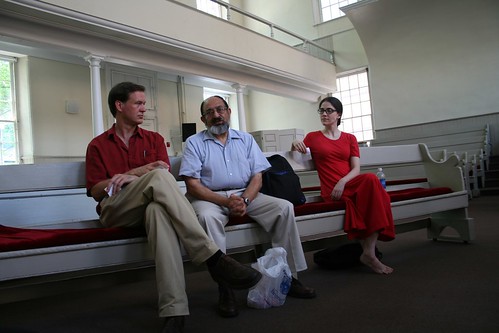
He gave a graphic illustration of the first, second and third world realities.
He took the twelve folks in the meetinghouse, and two represented the first world, where the people average $8 per capita per day, where, because of our welfare state and wealth, all had the minimum needs. To imagine the distribution of what the world produces, these two people who represent the first world get eight peaches, four each.
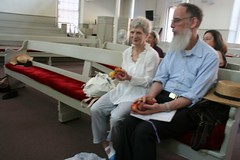
Five more represented the global middle class, those who make from $2 to $8 dollars per capita per day, they split a peach and a half...
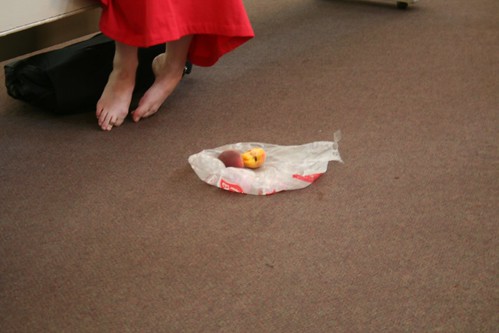
Five more, the global poor, who split half a peach with no pit, no hope of investment...
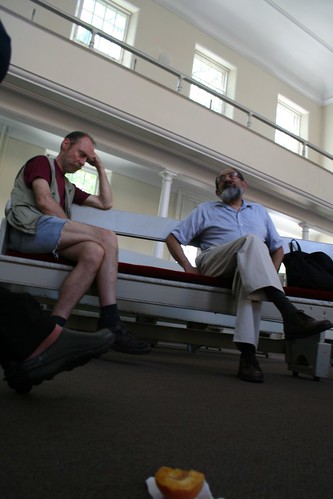
He suggests that Friends commit to learn what it is to need these things, fast from Seventh day at PM until after meeting some times, or not drinking water for the same time, or to wear summer clothing to meeting in the winter to experience what it is to be cold...
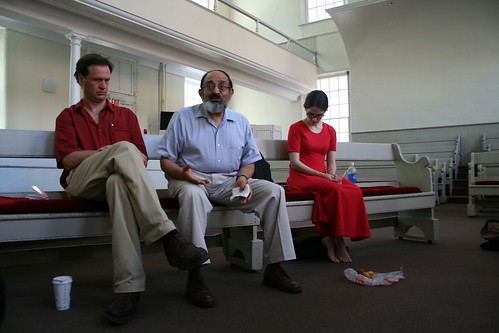
I've lived, with Genie somewhere between the second and third world in Ireland when we were younger... living on an average of 12 pence a day for almost a year, our water was brown with peat, our ribs showed ( I was around 145 lbs or so... ) we were always hungry, supplemented our food with what we could fish or forage, and I find what the above experiment misses is the knowledge that tomorrow and the day after and the week after, there will not be food, there will not be hot water and warmth... cold always in thy bones... clothes often damp from the rain... and still for me, the permanence is not comprehendible, someday we could escape to the US. I think his experimental approach is a good start, and I hope it will lead others to go, see how it is to live in places of want, that we can dedicate ourselves to meeting the minimum needs of all, and more. I urge fFriends to invite Radh to come to thy meetings.
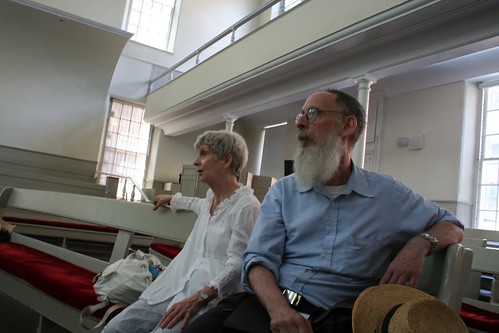


4 Comments:
It also leaves out the daily humiliations that discourage people from asking for help. Today the radio had a story on the growing healthcare disenfranchisement in Tenn. Among the final comments was the observation that the poorest folk will just give up on getting medicine if they encounter problems at the pharmacy.
I remember living on marginal land. While we didn't precisely go hungry, I got really tired of potatoes and beans. And the water that we drank had a lot of iron and sulfur leached out of a coal seam. That water led to some of those humiliations, because our clothes were never as "clean" as the folks on town water - we had a sort of yellowy reddish brown overdye on every bit of clothing we owned. And no matter how long we left things on the line, a faint sulfur smell clung to them. And the more we washed, the worse it was.
And of course, that meant that at school, we had to cope with teasing and bullying. My siblings and I were called down at least once to the principal's office to account for our "dirty" state. Not precisely the route to universal education.
I'm glad thee wrote... there was a part of the equation which bothered me, and I think we need to think about...
Here in the first world of the four peaches each, the top three persent get how many of those peaches. Yes, those at the bottom of our societies pyramid, get the minimum, often, but... we all don't get our four peaches...
Poverty and want in America has a different face, one out of every 135 people in the US are in the slavery of prison, not counting pre- trial and civil commitment, and they do not come from the top three percent of our society. They come from the places where the water tastes of the coal seam, and the crowded places in the cities, where the skin tone is darker and the hopes are not as bright as well...
We all need to share, but we also need to shake the tree at the top as well... get some of those peaches up there in the upper branches...
My dad dug coal... down there with thy folks... down where their is no light, and if there were, it would not pierce the coal dust. That was the days when the war for the unions was being waged, when miners died from the dust, the damp, and the Pinkerton man.
Looks like we're heading that way again in places in America where the sun does not shine as brightly...
Thee and thine are in my thoughts, sister.
Thine in the light
lor
I sometimes wonder if education wouldn't be more accessible to children from marginalized cultures if we didn't continue that marginalization in the classroom. I can remember my entire class being told very sternly not to "talk like hicks" for using some regionalism, or the constant refrain from one of my teachers: "hain't hain't a word!"
And of course the music we listened to at home was completely ignored in music appreciation - country, bluegrass, and old-time music were not to be appreciated so much as music that conveyed different class markers. It wasn't until I got to college that I found out that much of the music I listened to at home had roots in both Europe and Africa, some reaching as far back as the Middle Ages. It took even longer for me to realize the roots of the speech patterns that I worked so hard to conceal when I went out East to college.
It saddens, but doesn't surprise me when I hear young people talk about school being for "other folks". Schooling is so basic to getting the other staples that we really need to look at how that education is presented. When it is insulting and either totally removed from daily experience or so dumbed down as to be not worth the effort, how can we expect children to want that education?
This is an admirable goal, but I also have a concern about population. We are way over the carrying capacity of our planet, and I tend to believe that there will be a terribly harsh "adjustment" within my lifetime (probably pretty soon in my lifetime - assuming my lifetime outlasts it!)
I am for equitable distribution of resources, and I am also for the vastly increased use of birth control, and the abolition of fertility treatments (and, being a lesbian with lesbian friends, I know lots of frozen-sperm babies, and I dont' wish them ill, but it's still a crazy thing to be doing, using medical technology to make more babies than would occur naturally, on a terribly overpopulated planet!)
As for understanding poverty, many of us in the US just DON'T, and maybe won't. I myself think that fighting it is more important than experiencing it, though experience might be of use as well.
A coworker of mine just visited the Mexican border to learn more about immigration issues. It is a really tough issue. But, while she was down there there was some sort of "solidarity march" where people who don't have to walk through the desert, where many people attempting to immigrate die each year, in order, I guess, to "experience" it - but they actually have "sag wagons" and free and abundant access to water, not to mention that they can decide they dont' feel like it and go home at any point. and certainly not to mention that most of them have US passports that allow them to go wherever they want in the world. It might give a glimpse, but it also might let people feel "righteous" for doing something symbolic, and not even necessarily usefully symbolic.
Post a Comment
<< Home